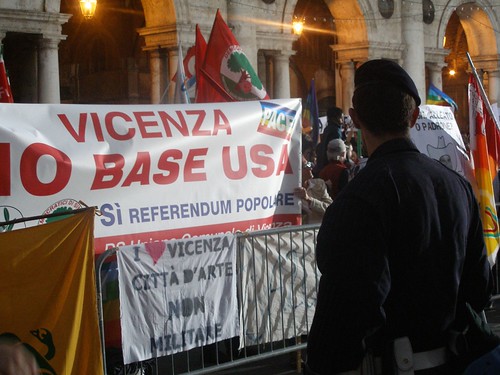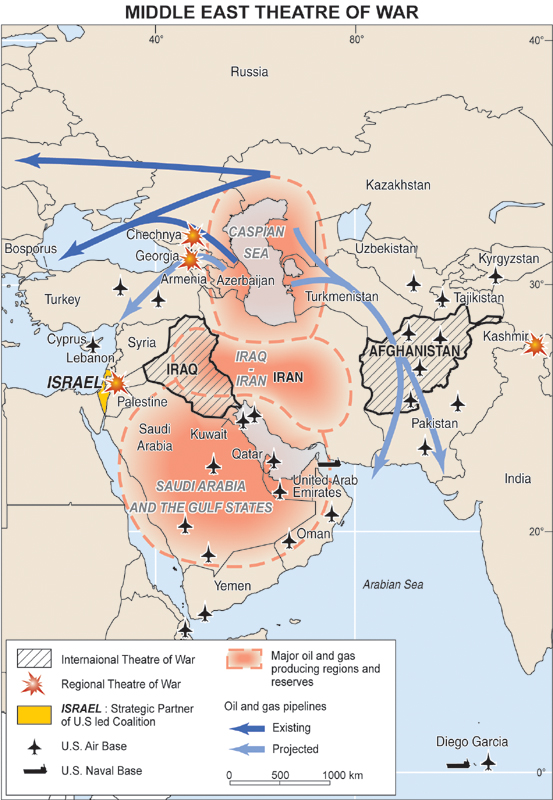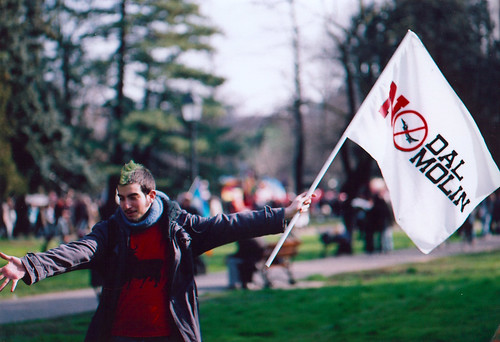

Scott Ludlam's No Bases World Map Project / MAP

REPORTS
Outposts of Empire: The case against foreign military bases / Sarah Irving, Wilbert van der Zeijden, Oscar Reyes / 1 March 2007 / Transnational Institute
Outposts of Empire tells of the everyday effects of foreign military bases at a local or national level: the displacement of people; the democratic deficit and loss of sovereignty that bases cause; their devastating economic, environmental and health impacts; and impunity about the crime that bases bring with them, including sexual violence. These analyses are accompanied by case studies that illustrate the problems of bases in Diego Garcia, Guam, Hawaii, Japan, Korea, Panama, the Philippines and Turkey, as well as highlighting the remarkable efforts that people on the ground have made to struggle against them. An introductory essay sets out the broader history and changing geopolitics of the US military presence abroad, and introduces the emerging global network that aim to close these outposts of empire and send the troops home.
Introduction
Loss of sovereignty: Turkey
Democratic Deficit: Philippines
Economic drain: Hawai’i
Map: global US military involvement (PDF)
Displacement: Diego Garcia
Environmental impact: Panama
Health hazards: Guam
Crime and impunity: Korea
Sex crimes and prostitution: Okinawa
Further reading
The International Network Against Foreign Military Bases / MAP (PDF) / LINKS / ARTICLES / Transnational Institute

US Department of Defense Base Structure Report 2005 (PDF)
This government document provides statistics on more than 700 bases that the US military maintains in dozens of foreign countries and territories. The report includes details such as locations, acreage, numbers of personnel, and “replacement value” in US dollars for the components of its worldwide infrastructure. For a critical analysis of the 2003 Base Structure Report, see this article by Chalmers Johnson.

ESSAYS
Outpost of empire / Wilber van der Zeijden / Red Pepper
America's Empire of Bases / Chalmers Johnson / TomDispatch.com
Empire v. Democracy: Why Nemesis Is at Our Door / Chalmers Johnson / TomDispatch.com
Bases, Bases Everywhere: Pentagon Planning in Iraq, 2003-2005 / Tom Engelhardt / TomDispatch.com
737 U.S. Military Bases = Global Empire / Chalmers Johnson / AlterNet
Evolving Empire: Chalmers Johnson on Bush's Major Troop Realignment / Democracy Now
Chalmers Johnson: “Nemesis: The Last Days of the American Republic" / Democracy Now
U.S. Military Bases and Empire / MAP (PDF) / Monthly Review

US Military Bases Around the World / Daily Kos
US Military Bases: The Spoils and Deceptions of War / Kurt Nimmo / CounterPunch
New US Military Bases: Side Effects or Causes of War? / Zoltan Grossman / CounterPunch

Thomas P.M. Barnett / The Pentagon's New Map / MAP / BOOK

The Pentagon's New Map: Conversation with Thomas P.M. Barnett / Conversations with History: Institute of International Studies, UC Berkeley
MISC
Closing Bases: Supporting Communities / Fellowship / Winter 2007
This special issue of Fellowship has been published in conjunction with the International Conference for the Abolition of Foreign Military Bases, held in Quito and Manta, Ecuador from March 5-9, 2007. Please visit www.no-bases.net for more information about the conference and to support the global movement to close military bases.
Bases, Empire, and Global Response / Catherine Lutz / Fellowship / Winter 2007
Global Expansion of U.S. Military Involvement: A World Map for Activists (PDF) / Brian McAdoo / Fellowship / Winter 2007
"Enduring" U.S. Bases in Iraq: Monopolizing the Middle East Prize / Joseph Gerson / Fellowship / Winter 2007

U.S. Foreign Military Bases & Military Colonialism: Personal and Analytical Perspectives / Joseph Gerson / International Consultation on U.S. Bases / Seoul / December 1-2, 2003
Ten Reasons to Withdraw all US Foreign Military Bases / Joseph Gerson / Peacework
Global Spread of U.S. Bases (Real Audio) / Chicago Public Radio
Empire? / US Military Expansion and Intervention / MAP / Global US Troop Deployment, 1950-2005 / Global Policy Forum
Democratic Social Movements against Militarization (PDF) / Bibliography of Recent Research on Militarization and Demilitarization (PDF) / Catherine Lutz / Watson Institute
Empire is in the details (PDF) / Catherine Lutz
Recent writing that identifies the United States as an empire has focused overwhelmingly on its political-economic underpinnings, without questioning the cultural making of value or examining empire as more than an elite project. This writing has not drawn on ethnographic work that would reshape it in more adequate, less economistic forms, make the human face and frailties of imperialism more visible, and, in so doing, make challenges to imperial practice more likely. Focusing on military institutions, and via some examples from U.S. imperial projects in the Philippines and elsewhere, I suggest where ethnographies of empire might be done and what vulnerabilities they might explore.
Catherine Lutz on US empire and militarism (MP3) / The Monitor
Subtopia's Baseworld Archipelago Meltdown / Subtopia's "bases" tag @ del.icio.us
If the U.S. is ultimately leaving Iraq, why is the military building 'permanent' bases? / Friends Committee on National Legislation
Report on the International Conference for the Abolition of All Military Bases (PDF) / Lalit
Military Geography for Professionals and the Public / John M. Collins / National Defense University / Reviewed by Megan Shaw Prelinger at Bad Subjects
US Air Force Bases / GLOBEMASTER: US Military Aviation Database

NO BASES / CONFERENCE 2007
NO BASES: International Network for the Abolition of Foreign Military Bases / International Conference for the Abolition of Foreign Military Bases / Ecuador / 5-9 March, 2007
Dispatches from the No Foreign Military Bases Conference 2007 / Declaration: International Conference for the Abolition of Foreign Military Bases / American Friends Service Committee
Bases Fuera: No Military Bases Network Launch Conference / Joseph Gerson / Quito, Ecuador / March 5, 2007 / American Friends Service Committee
A New Network Forms to Close U.S. Overseas Military Bases / Medea Benjamin
An Anti-Bases Network Finds its Base / Herbert Docena / Focus on the Global South
Ecuador: International Conference for the Abolition of Foreign Military Bases / Marc Becker / naclanews
Europe solidaire sans frontières / Military Bases
Report of the International Anti-US Bases Conference / World Social Forum / Mumbai, India / 17-20 January 2004

LATIN AMERICA
U.S. Military Bases in Latin America and the Caribbean / October 2001 / Foreign Policy in Focus / International Relations Center
U.S. Military Bases in Latin America and the Caribbean / August 2004 / Foreign Policy in Focus / International Relations Center
The Inescapable Beat: US Military Bases in Brazil / Robert Fisk / CounterPunch
ACJ Ecuador - No bases militares

ASIA
U.S. Military Bases in Central Asia / Lionel Beehner / Council on Foreign Relations
U.S. Military Bases in Okinawa, Japan (MAP)
No Crimes by U.S.Troops! / Korea
YONIP! Yes, Observe National Independence & Peace / Philippines
AUSTRALIA
Australian Anti-Bases Campaign Coalition

HAWAI'I
DMZ Hawai'i/Aloha 'Aina / A Brief Overview of Militarization and Resistance in Hawai‘i (PDF) / Hawai'i Involvement in Foreign/US Military Bases Movement
Noho Hewa: The Wrongful Occupation of Hawai'i / Map of Military Occupied Areas in Hawai'i
The military takes up 20.6% of the total land area of the State of Hawai'i (about 200,000 acres). 56% of these lands are "ceded lands", or lands once under the Hawaiian monarchy that were granted when Hawai'i was purportedly annexed to the United States in 1898. In 1995 there were 405 toxic military sites in 122 facilities, with 6 of those facilities on the "Superfund" National Priorities List. As of 1995 the cleanup cost to taxpayers was $1.08 billion.
Noho Hewa: The Wrongful Occupation of Hawai'i is a documentary film that began as a project about resistance to the post 9-11 military expansion happening in Hawai'i, the largest expansion since WWII. The Army is bringing a Stryker Brigade to Hawai'i, which consists of about 300 urban assault vehicles that weigh 20 tons each, scheduled to arrive here by the end of the year. The amount of land being taken by the military to accommodate the Stryker is roughly the size of the island of Kaho'olawe, which was destroyed by the military. In addition, the state of Hawai'i is currently trying to bring a nuclear aircraft carrier group to Pearl Harbor, a site that history has shown us is a prime military target.

"INDIAN COUNTRY"
Native American Sacred Sites and the Department of Defense / Edited by Vine Deloria, Jr. and Richard W. Stoffle
Native American Affairs and the Department of Defense / Donald Mitchell and David Rubenson (RAND)
Nuclear and chemical warfare operations - Unwanted neighbors / Brenda Norrell / Indian Country Today


